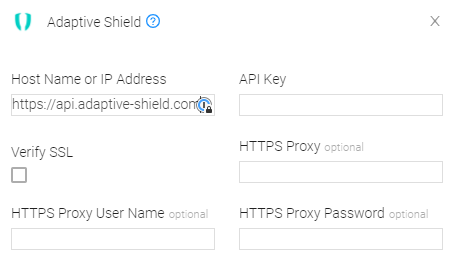Adaptive Shield
Adaptive Shield is a security posture management platform used to help businesses manage their cloud services.
Types of Assets Fetched
This adapter fetches the following types of assets:
- Devices
- Users
- Software
- SaaS Applications
Parameters
-
Host Name or IP Address (required, default:
https://api.adaptive-shield.com) - The hostname or IP address of the Adaptive Shield server. -
API Key (required) - An API Key associated with a user account that has permissions to fetch assets.
-
Verify SSL - Select whether to verify the SSL certificate of the server against the CA database inside of Axonius. For more details, see SSL Trust & CA Settings.
-
HTTPS Proxy (optional) - Connect the adapter to a proxy instead of directly connecting it to the domain.
-
HTTPS Proxy User Name (optional) - The user name to use when connecting to the value supplied in Host Name or IP Address via the value supplied in HTTPS Proxy.
-
HTTPS Proxy Password (optional) - The password to use when connecting to the server using the HTTPS Proxy.
To learn more about common adapter connection parameters and buttons, see Adding a New Adapter Connection.

Advanced Settings
Note
Advanced settings can either apply for all connections for this adapter, or you can set different advanced settings and/or different scheduling for a specific connection, refer to Advanced Configuration for Adapters
- Days of events data (required, default: 90) - Specify the number of days to fetch data about events.
- Fetch users from Users inventory (optional, default: False) - Select to fetch users managed by the system from Users Inventory, in addition to system users and user activities.
Note
To learn more about Adapter Configuration tab advanced settings, see Adapter Advanced Settings.
API
Axonius uses the
- api/v1/accounts/
{account_id}/device_inventory to fetch devices - api/v1/accounts/
{account_id}/user_inventory to fetch users.
Updated 5 months ago
